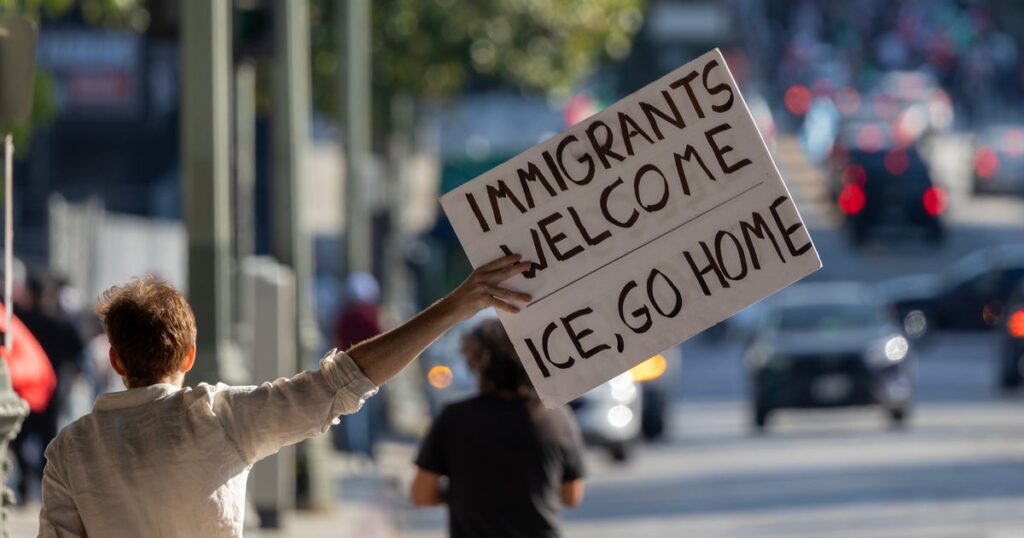As Immigration and Customs Enforcement agents detain immigrants, sometimes violently, and deport them away from their families under the direction of President Donald Trump, politicians and celebrities have been sharing why they support “hardworking” immigrants.
In response to ICE raids in Los Angeles, Kim Kardashian, for example, wrote on social media that “When we witness innocent, hardworking people being ripped from their families in inhumane ways, we have to speak up,” while Republican Rep. David Valadao of California, recently wrote that he is urging the Trump administration “to prioritize the removal of known criminals over the hardworking people who have lived peacefully.”
Being hardworking and productive are not bad traits, but when people exclusively praise and defend immigrants for being hardworking, it is not the full compliment people think it is.
Immigration policies aren’t just politics — they’re personal. At HuffPost, we explore the human stories behind the headlines, reporting on how immigration laws impact real people and communities. Support this vital coverage by joining our membership program today.
Immigrants Deserve Dignity And Respect, Regardless Of How Hardworking They Are.
Vanessa Cárdenas, executive director of the immigration advocacy group America’s Voice, said when she grew up in Bolivia, working with “ahínco,” meaning to put “your soul and your heart into it,” was a good thing to be. But as a Latina, she has qualms when “hardworking” is used to suggest that “immigrants should just be doing the jobs no one else wants to do.”
“I think the focus of the conversation needs to be on the fact that this administration is targeting people in an indiscriminate manner, and in that process, they’re really harming families and communities and really affecting not just their livelihoods, but their communities’ livelihoods,” Cárdenas said.
It is true that immigrants do hard work, and without them, the American economy would collapse. The government estimates that about 40% of hired crop farmworkers that harvest food for our tables do not have work authorization. Immigrants are also the demographic that is most likely to work evenings, overnights and on the weekends in a range of critical fields like health care, commercial bakeries, dairy and meatpacking firms, or in construction labor, according to a report from New American Economy.
But they are also a vulnerable group that can get hurt on the job without recourse like workers’ compensation. Most immigrants who work on Wisconsin dairy farms frequently get hurt on the job and often go without medical care, out of fear of getting evicted and fired by employers or deported, as one 2023 ProPublica report detailed.
Praising immigrants as hardworking “masks the degree to which, for so many immigrants, being ‘hardworking’ means working in risky, exploitative conditions, further sidelining people who are vulnerable, can’t work, unemployed, or trying to resist exploitation,” said Soraya Chemaly, an activist and author of the upcoming book “All We Want Is Everything: How We Dismantle Male Supremacy.”
“Is a person [who’s] seeking safety and peace, but unable to work, deserving of care and dignity?” Chemaly continued. “In the end, the logic of ‘hardworking’ goes a long way to subtly reflect a deep strain of white supremacist, gendered, and capitalist logic in which people are ordered as resources, in terms of what can be extracted from them, rather than their inherent humanity.”
Michael Lechuga, the chair and an associate professor in the Department of Communication and Journalism at the University of New Mexico, said the focus on migrants’ hard work in the U.S. has historic roots in the 1940s-1960s Bracero Program that allowed millions of Mexican men to work legally in the United States on short-term labor contracts.
This characterization of migrants as braceros “limits or reduces the migrant to the bracero … [which in Spanish means] the arm,” Lechuga explained. “All you care about is their arms. You don’t really care about their whole body.”
He noted this focus on migrants’ labor persists to this day and can lead migrants to be “demonized” by conservatives for stealing jobs, but he noted the defense of those on the left that “No, they’re actually really hardworking” is not a useful counterargument, either.
In both cases, migrants are “valuable only at economic terms, but any sort of a social responsibility that the state needs to provide for the well-being of the whole human ― that’s too much of an ask,” he said. As someone who grew up in an immigrant family, Lechuga finds that being called “hardworking” brings up mixed feelings.
“On the one hand, it is a way to flatten who people are,” he said. “But at the same time, in my own personal experience, that was what we were told we needed to develop in order to advance in society.” He noted that being hardworking can become a narrative immigrants take on for themselves as part of their “assimilation narrative.“
Ultimately, a more inclusive, whole-hearted support of immigrants doesn’t need to come with a qualifier or caveats of what they do or will do for the U.S. ― it acknowledges that their existence alone is worthy of care, dignity and respect from the people and institutions that govern them. They are not just our co-workers; they are our neighbors, relatives and friends.
Take what Los Angeles Dodgers player Kiké Hernández wrote on Instagram over the weekend to defend the people in his city being targeted by ICE.
“This is my second home. And I cannot stand to see our community being violated, profiled, abused and ripped apart,” wrote Hernández, who was born in Puerto Rico and plays in Los Angeles. “ALL people deserve to be treated with respect, dignity and human rights.”
Notably, he includes no commentary about how productive or law-abiding immigrants are or what immigrants do for the U.S. economy as reasons they deserve respect and dignity. That emphasis on “all” is pointed, and one we could all learn from.
Read the full article here


